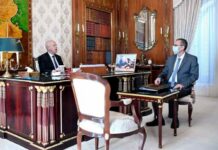May 24, 2021
A document was published on May 23, by the British newspaper Middle East Eye. The contents of the document, mentioning a proposed “constitutional coup” in favor of President Qaïes Saïed, sparked a media outcry.
An initialed document with a “top secret” watermark was published yesterday by the British newspaper MEE. The written word has been at the center of all discussions ever since. Conspirators of all stripes have gone out of their way to “analyze” this document. After all, it was a foreign media that published it, so its credibility would not be in doubt.
However, on the international press side, Fact Checking was rudimentary. As crass as national investigative journalism, which searched for a name to harness any reproach for a non-existent coup. However, as Tunisia is never short of “specialists”, a name was found, and the accusation uttered, even half-worded.
Ridicule Does Not Kill
If we go beyond the ridiculousness of the context, we can nonetheless identify a few facts. Just because a draft is hypothetically geared towards the president’s chief of staff, doesn’t necessarily mean she read it. Second, white notes rarely contain dull watermarks, a blank page, and a course in public law. Then, if Qaïes Saïed could attempt a coup, he probably would have tried. After all, the president had called himself “head of the military and civilian armed forces.” That being said, there is no proof of the authenticity or seriousness of the document in question.
The provisions of article 80 of the Tunisian constitution, subject to blunders by the Tunisian press, are as inapplicable as a coup d’etat within the rules of the art. The 2014 Constitution is littered with paradoxes. So much so that no power has real checks and balances. The President of the Republic cannot dissolve the ARP (Assembly of People’s Representatives).
And neither the president nor the head of the ARP can formalize a motion of censure against the head of government.
So “constitutional dictatorship” would be virtually impossible in Tunisia. Although the hypothesis made the representatives of the political class speak. Ennahdha member Fathi Ayadi said his party is “against the spreading of this kind of accusation” – understand, against Qaïes Saïed – as well as against “those who seek to disturb the general atmosphere”. This is not without displeasing the very talkative ex-Nahdhaoui minister, Abdellatif Mekki, who thinks that “Nadia Akacha would know more than President Saïed”. For his part, Mabrouk Kourchid, member of the ARP for the Tahya Tounes party (‘Long Live Tunisia’ Party), believes that the broadcasting of this document would be “political immaturity”.
Belote, Rebelote and Ten de Der
The President of the Tunisian Republic, Qaïes Saïed, holds hostile speeches. However, gossip and prestige represent the bulk of his tenure. It would be exactly for this reason that Qaïes Saïed does not hesitate to stage his actions and his movements, however honorary or cajoling they may be.
Nevertheless, the president is perfectly mandated to represent Tunisian diplomacy. And diplomacy is the last resort of Tunisian power. The state cannot, in fact, afford to offend the world powers. The president has therefore been very cautious in his interactions with heads of state and international institutions. However, he would not have shown himself to be very resilient to the influences of power.
The situation is not much better among the rest of the country. The head of government, Hishem Meshishi, is extremely unpopular. Members of his cabinet are notably suspected of corruption, and often accused of ineffectiveness. As for the president of the Assembly of People’s Representatives (ARP), Rached Ghannouchi, he seems to disappear behind all the political controversies. The Islamist leader is also losing momentum within his own party, Ennahdha. The party will hold its eleventh congress by the end of December, and the election of a president sparks debate within the party, until then indivisible.











